My sincere thanks to James Swift for this fantastic overview!
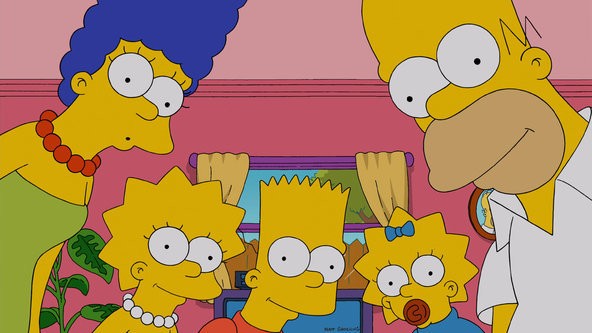
I can’t express just how much The Simpsons meant to me when I was a kid. While the show today is a pale, pale imitation of its former greatness, I think it’s safe to say that everything from Season One up to the whole Armin Tamzarian nonsense was the best show that’s ever been on television.
Every weekday at 7 p.m my local Fox affiliate, WATL-36, played back-to-back classic episodes. Mr. Plow. The Monorail. I Choo-Choo Choose You (I know these aren’t the episode names, just roll with me here). At one point, I could quote every line of Cletus the Slack-Jawed Yokel dialogue.
And, of course, I waited all week long for the latest new episode at 8 p.m each Sunday night. Heck, I’m so old, I remember when it used to come on Thursday nights, people.
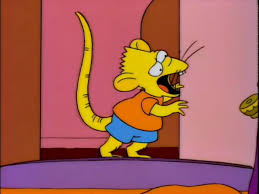
It’s amazing how pervasive an influence that show had on not only me, but American society itself. The self-reflexive, pop-culture-referencing humor of the program became the default template for all forms of comedy ever since, ultimately displacing the situational humor of every comedy TV show and movie before it. The Simpsons was meme humor 20 years before meme humor was a thing. No surprise that, even today, “Golden Age” Simpsons remains as hilarious as ever.
Like every other popular TV show with a large adolescent audience, The Simpsons were ripe for the video game treatment. While we did get one outstanding arcade beat-em-up from Konami (why wasn’t that game ported to home consoles, by the way?) by and large The Simpsons games of the 1990s didn’t just suck. They were the suckiest bunch of sucks that ever sucked.
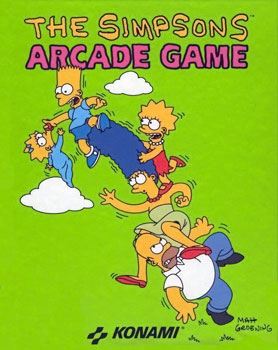
In total, seven different Simpsons branded video games landed on Sega consoles in the ’90s. Since we’ll be reviewing these suckers more in-depth at some point, consider this compendium of Simpsons software an appetizer for a much longer detour into Sega’s version of Springfield.
The Simpsons: Bart vs. The Space Mutants
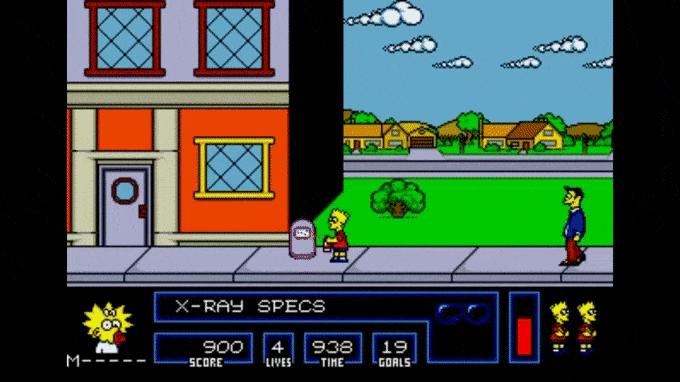
The first home console Simpsons game is most famous (or infamous) for being a NES release, but the title also got ported to the Genesis, the Master System and the Game Gear. To this day I am convinced this was originally a licensed game modeled after the 1988 Roddy Piper movie They Live, right down to the whole “magic sunglasses that let you see secret aliens” motif. As a standard platformer, it’s not horrifically offensive, but it offers precious few things we haven’t already experienced a million times before in much better titles. The Genesis version has better visuals and longer levels (including a couple of extra stages) than the Game Gear/Master System ports, but in all three versions the controls are utterly terrible, making even the most rudimentary platforming sequences maddeningly frustrating. One final point of contention: despite having “Space Mutants” in the title, neither Kang or Kodos show up anywhere besides the cover of the instruction manual.
The Simpsons: Bart vs. The World
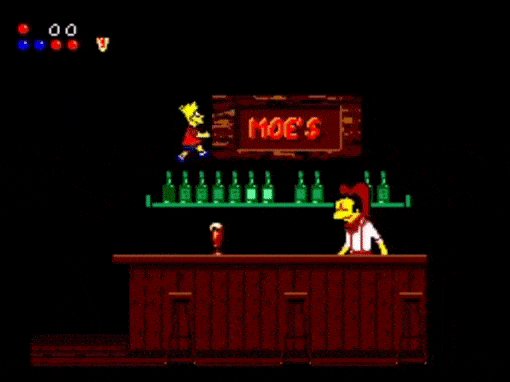
This is another game most people remember as an NES offering, but it also received the Master System and Game Gear treatment. In terms of pure aesthetics, both versions look astoundingly better than the NES game, with completely redrawn sprites and a much brighter color palette. Unfortunately, the game doesn’t play any better, with clunky controls, repetitive level design and – again! – infuriating platforming sequences. As was the case with Bart vs. The Space Mutants, I remain convinced that this had to have been a wholly unrelated game that had The Simpsons characters dropped into it at the last second. Are there any movies/cartoons out there that begin with a bunch of Chinese pirates tossing firecrackers at a ten-year-old, then conclude with said child getting attacked by a megaphone-tossing, geriatric movie director? If so, Bart vs. The World is that product’s spiritual video game adaptation.
The Simpsons: Bartman Meets Radioactive Man
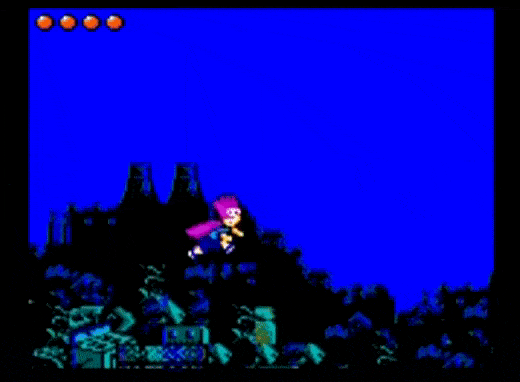
This Game Gear release is a port of a game that originally came out way late in the NES life cycle. As is the case with Bart vs. The World, the Game Gear adaptation looks considerably better than the 8-bit Nintendo game, even if the color saturation is perhaps a bit too strong (case in point: the first stage takes place in a heliotrope-colored junkyard.) Bartman Meets Radioactive Man starts off promising enough, but once the side scrolling shooting sequences kick in (and the level design starts repeating ad nauseam), the title gets real boring real fast. The jumping, while slightly more manageable than the previous games, is still subpar, and the last two levels are brutally difficult. Bartman Meets Radioactive Man is playable, although the lack of a co-op mode (with player 2 controlling Fall Out Boy, naturally) is a big bummer.
The Simpsons: Bart’s Nightmare
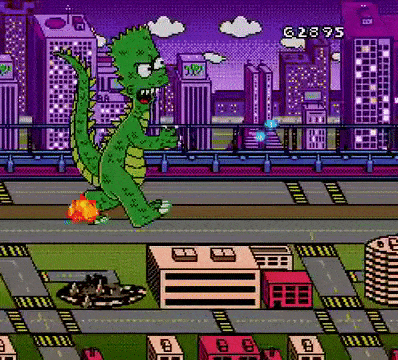
A very, very loose adaptation of “Bart Gets An F,” one of the series’ most beloved episodes, Bart’s Nightmare is a game that more than lives up to its title. There’s only five levels in the game, not counting the “overworld” which has Bart racing against the clock in Dreamland to collect five pieces of homework. Once you’ve nabbed all the homework, you guide Bart through all sorts of surreal levels, including a Bart-zilla sequence, an Indiana Jones clone, and an episode of Itchy & Scratchy. The nods and winks to the show are pretty cool (complete with a cameo from Smilin’ Joe Fission!), but the controls are atrocious, especially during the Bartman level. The music is fantastic and the sprites are above-grade, but beyond that, Bart’s Nightmare is truly a snore.
Krusty’s Super Fun House
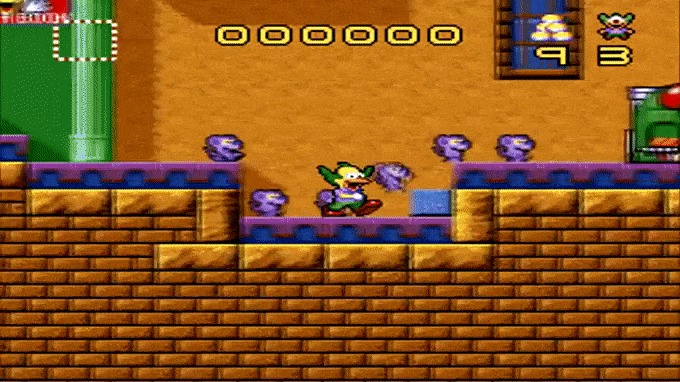
This is easily the best Simpsons game to come out on any Sega hardware and it isn’t even close. Sure, it’s a reskinned version of the classic Amiga game Rat-Trap with Homer, Bart and (of course) Krusty the Clown shoehorned in, but at least it’s not platforming garbage. All three iterations of the game are pretty darn good, so no matter which version you play (Master System, Game Gear, or Genesis), you’re guaranteed a fun little time waster. You run around mazes as Krusty and strategically drop and pick up blocks, so you can lead a bunch of rodents to their demise (usually, at the hands of Bart, Homer or Maggie operating a Rube Goldberg rat-slaying device). The premise is simple, but as the the levels get bigger and cluttered with enemies, it turns into quite the cerebral challenge. Unlike the Lady Krusty Mustache Remover and Krusty Brand Imitation Gruel, Krusty’s Fun House is one product that deserves the coveted “Krusty Brand Seal of Approval.”
The Itchy & Scratchy Game
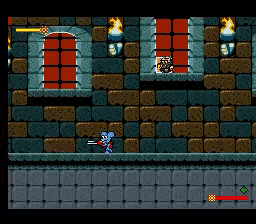
Oh yes, there was an Itchy & Scratchy game on the Genesis and Game Gear. The Genesis game was never released (although it isn’t hard to find the ROMs floating around out there in Internet-Land), and I don’t recall ever seeing the GG version on store shelves anywhere back in the day. One thing’s for sure, though… they do exist. The gameplay here is pretty unusual, and while it does take some time to get used to, once you figure out the game’s nuts and bolts it does become pretty fun and fluid. You control Itchy (the mouse) and run around multi-layered levels, picking up miscellaneous weapons (dynamite, cinder blocks, cacti, mallets, etc.) and bashing Scratchy’s brains out until he runs out of health. After that, there’s a very Dr. Robotnik-like boss fight, before the literal cat-and-mouse antics resume. With only seven stages, there’s not a whole lot of replay value, but it’s quite serviceable for a one-and-done playthrough on a boring afternoon. It’s also noteworthy for being the only K-A rated game that allows players to vivisect one another with chainsaws…
Virtual Bart
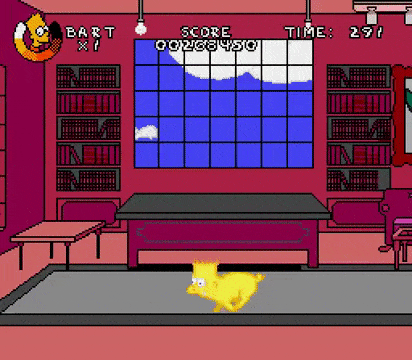
Depending on your perspective, Virtual Bart is either the best bad game on the Genesis or the absolute worst good game on the console. There’s no denying it has some control issues (as well as some horrible game design choices to artificially inflate the difficulty), but it’s still so much fun. It’s definitely the funniest Simpsons game on Sega hardware, and has more references to the actual show than all of the previous games put together.
Using more or less the same motif as Bart’s Nightmare, the crux of Virtual Bart revolves around six different mini-games. There are platforming stages (one in which Bart is turned into a dinosaur and another in which he becomes a pig trying to escape a Krusty Burger factory), a Road Rash-like post-apocalyptic racing segment, a pseudo 3D water slide level, a Prince of Persia-esque, treetop acrobatics romp with baby Bart and, my personal favorite, a strangely compelling physics-based shooter where you peg all the kids at Springfield Elementary with eggs and tomatoes. The graphics are great and the sound effects are downright superb – indeed, the audio in this one might actually be better than in the SNES iteration. It’s not a superb game by any stretch, but it’s probably the most authentic Simpsons game you’ll find on Sega hardware. And even if you aren’t a diehard Springfieldianite, it’s still a perfectly cromulent addition to your Genesis library.

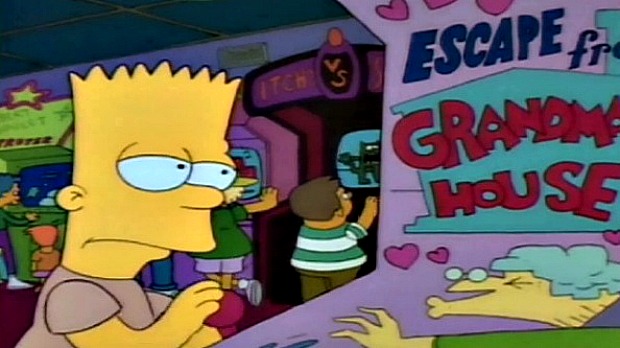
11 replies on “The Simpsons and Sega: Genesis Does What Ninten-D’oh!”
I remember games magazines back in the day attempting to spin the home computer (ST and Amiga) versions of Bart vs. The Space Mutants as being almost as good as actually having the arcade game to play at home, but being rather unconvincing. Still, it was a game I was always curious to play, though I somehow never got around to it! Apparently I wasn’t missing too much 🙂
Unfortunately, I received the NES version as a gift, and, uh… yeah. It’s as bad as everyone says.
I never bothered with the Genesis Simpsons games, aside from renting Krusty’s Fun House (which I actually did enjoy). I think it went back to before my Genesis days, when I saw Bart vs the Space Mutants in Nintendo Power, and couldn’t wait to try it. I remember my friend getting it and rushing over to his house to try it, and then hating it, what a huge disappointment! I did like the arcade game though, I guess Konami just didn’t have the rights to make Simpsons games on consoles, and didn’t want to make a deal with Acclaim.
Krusty’s Fun House is pretty solid, I agree.
Didn’t the Simpsons Arcade finally come out on Xbox 360 a few years ago? I remember playing it on a more modern console and thinking that the game was much more entertaining in the arcades. Ah well.
The Simpsons arcade game was released on PS3, Xbox 360, and ios. And then it was unceremoniously removed and is no longer available for purchase. : (
Yeah, you’re right, it was on the 360 Live Arcade. I played through it recently as well, and I do agree that it hasn’t really aged well. The one thing that stuck with me was that it’s actually too long for the type of game. I was expecting just a quick arcade game, but the thing just keeps going and going, it’s a bit of an endurance test to get to the end. I still think it’s much better than just about all the console Simpsons games though.
Agreed.
As a kid, I was sure Simpsons Arcade was better than Konami’s SNES/Genesis TMNT brawlers but now it seems worse. Might have just been lack of exposure; we could play those TMNT games for hours at home, but Simpsons was always a forbidden fruit, limited to quick jaunts at the arcade. Plus the Simpsons license was worth more in those days than TMNT (at least in my social circle), but now that matters a lot less than the gameplay.
One other fun fact about Simpsons Arcade: the only port (at the time) seems to have been for DOS. Such a terrible choice; Konami surely could have made bank bringing it to the consoles. I’ve never heard an explanation for why they didn’t, but I have to think there was some kind of licensing conflict with Akklaim.
+1 for that great headline. Had a nice chuckle.
All credit goes to James Swift for that one. Top notch headline, I agree.
Some folk’ll never lose a toe, but then again some folk’ll, like Cletus the slack jawed yokel! Seriously though, I pop in the Genesis’ version of Virtual Bart occasionally just to throw tomatoes at (Chalmers voice) SKINNER!